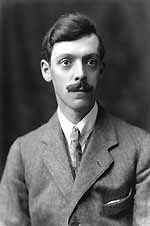John Anderson (philosopher)
| John Anderson | |
|---|---|

John Anderson, University of Sydney, 1926
|
|
| Born |
1 November 1893 Stonehouse, Lanarkshire, Scotland |
| Died | 6 July 1962 (aged 68) Sydney, Australia |
| Alma mater | University of Glasgow |
| Era | 20th-century philosophy |
| Region | Western Philosophy |
| School |
Analytic philosophy Australian Realism Scottish Common Sense Realism |
|
Main interests
|
Political philosophy, ethics, philosophy of sexuality, philosophy of religion |
|
Influences
|
|
John Anderson (1 November 1893 – 6 July 1962) was a Scottish-Australian philosopher who occupied the post of Challis Professor of Philosophy at Sydney University from 1927 to 1958. He founded the empirical brand of philosophy known as Australian realism (see Scottish realism).
Anderson's promotion of 'free thought' in all subjects, including politics and morality, was controversial and brought him into constant conflict with the august senate of the university. However, he is credited with educating a generation of influential 'Andersonian' thinkers and activists—some of whom helped to place Sydney in the forefront of the 'sexual revolution' of the 1950s and 1960s.
To Anderson, an acceptable philosophy must have significant 'sweep' and be capable of challenging and moulding ideas in every aspect of intellect and society.
Anderson was born in Stonehouse, Lanarkshire, Scotland and educated at the former Hamilton Academy from which school he won a bursary to attend the University of Glasgow in the university's Bursary Competition of 1911. Anderson was listed among notable former pupils of Hamilton Academy in a 1950 magazine article on the school. His elder brother was William Anderson, Professor of Philosophy at Auckland University College, 1921 to his death in 1955, and described as "the most dominant figure in New Zealand philosophy."
Anderson graduated MA from Glasgow University in 1917, with first-class honours in Philosophy (Logic and Moral Philosophy), and first-class honours in Mathematics and Natural Philosophy. After graduation, he was awarded the Ferguson Scholarship in Philosophy and the Shaw Philosophical Fellowship, the examinations for which were open to graduates of any of the four Scottish universities.
He served as Assistant in Philosophy at the University College, Cardiff (Cardiff) (1917–19), in Moral Philosophy and Logic in the University of Glasgow (1919–20) and lectured in Logic and Metaphysics at the University of Edinburgh (1920–26).
...
Wikipedia
